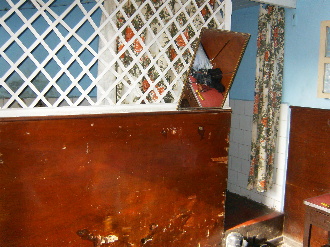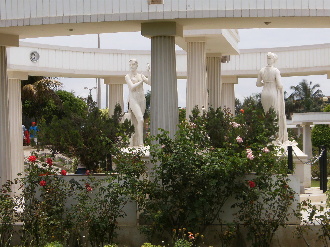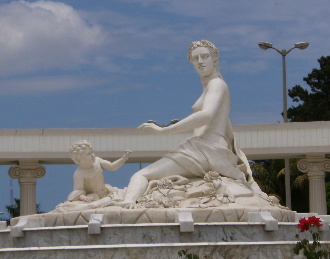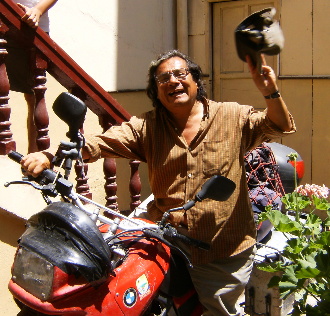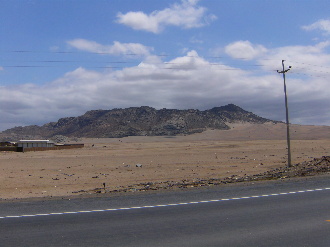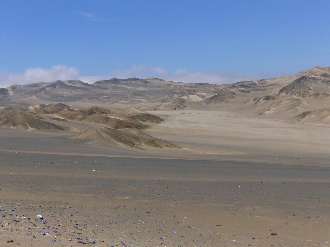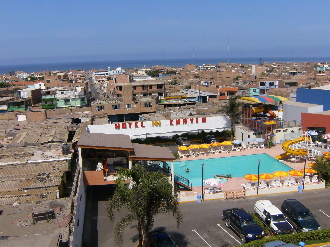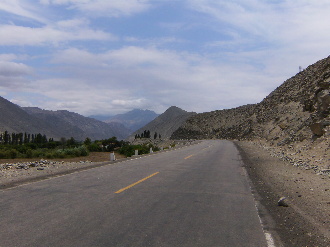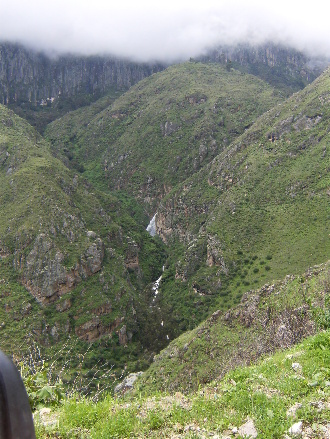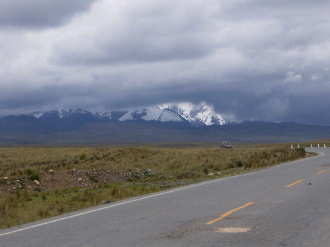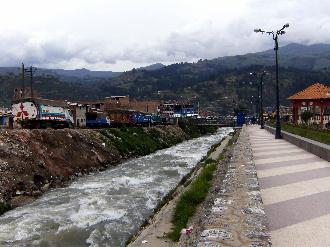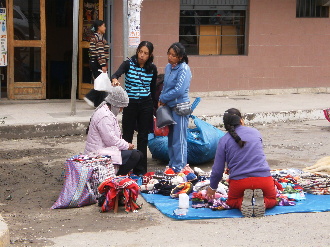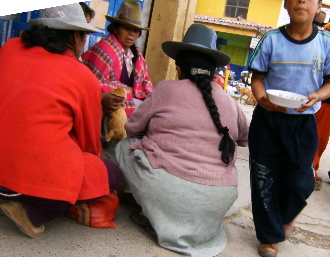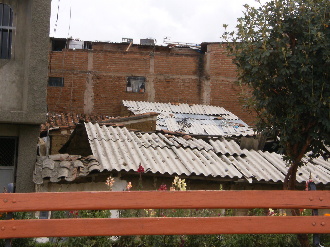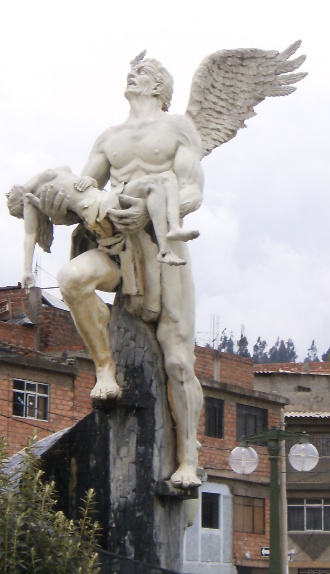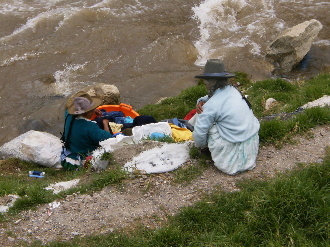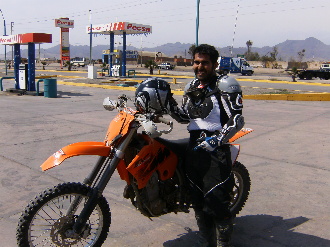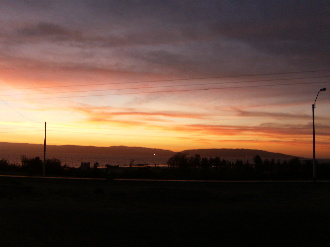Desert & Mountains
Now who would have thought in their wildest dreams that they would be personaly serenaded by an opera tenor performing 'O sole mio' in a busy street, in a little Peruvian desert town?There is no garage at the Hotel so I drive my motorbike through the lobby and into the tiny courtyard garden, where, trying to make a tight right hand turn around a raised flowerbed, the bike once more blows a fuse. That will have to wait until tomorrow as now I am too tired to fix it. The room is very basic, the linen clean but well worn and the bed sags in the middle, but after a meal of chicken (that tastes like cardboard) I sleep like a log.
Sheer luxury
This is a strange little town, with a modern façade built onto crumbling older main structures, and poorly built modern buildings too. It is like most of the lowland towns in Peru. I decide that I can put up with the poor facilities in the hotel for another night and go out to explore. The showpiece of the town is a narrow park that runs alongside a small river and is dotted with statues in the classic style.
In the morning I replace the fuse and during this time another of the guests introduces himself to me. He speaks very good English which he learned in Europe. He is Venezuelan by birth, but spent many years in Europe singing opera, and proceeds to serenade me with a rendition of O Sole mio, His voice has obviously been well trained, but now in his later years , is showing signs of age. Nevertheless the final high notes are strong, clear and controlled.
An hour later he sees me into the traffic and as I finish getting ready asks if I could spare a little cash. This touches my heart, to see a man that once enjoyed the cities of Milan, Paris and London down on his luck in a little desert town like Chicalayo. I give him $20 and to save his pride tell him it is payment for the song he sang earlier. There on the side walk he bursts into song once more with another rendition of O sole mio, this time a little stronger with more control. I set off south with those last high tenor notes still ringing in my ears and hum the tune to myself for the rest of the day. He wrote his name and email address on my map, the only piece of paper I had readily available, but unfortunately I lost it somewhere on my journey.
Walter, the opera singer
The desert rolls on beneath my wheels in an endless stream of trucks that belch black smoke, pickups that drive too slow and cars that drive too fast. There a many abandoned adobe houses along the highway, and in other places Adobe bricks drying in the sun to build more. Dont like the locality? Simple, move to somewhere you like better, mix up some mud and straw and build a new house.
There is not much difference in one part of the desert to the next. Occasionally I went across bridges spanning dry riverbeds with a flush of green along the banks, but it is the smell of the desert that I remember as well. It smells horrible in places, like the smell you get from very old diesel fuel; slightly sulphurous and unpleasant. Not the whole desert, just now and again. The discarded rubbish thrown from cars and trucks along the roadside and the rubbish tips on the edge of every town are also part of the average desert scenery here along with the abandoned adobe houses and new adobe bricks drying in the sun of course.
Desert landscape complete with strewn rubbish.
Out of town it all looks much cleaner, but it still smells of petroleum.
After spending the night in Chimbote I once again ploughed ahead through a bland desert landscape with glimpses of the sea here and there until reaching the coastal town of Barranca. The Hotel was a good quality 3 star hotel so I decided to stay here for a couple of days. The hotel has a swimming pool and I spent the afternoon in the pool bar drinking coffee and talking to a local farmer who had brought his granddaughter into town to enjoy a swim.
Hotel Chavin has a fine view of the sea.
Much refreshed from my day off from travelling I rode back the way I came for a few miles before branching off down a road that followed a river up into the mountains. At the delta there are broad fields of sugar cane but further up the river the mountain walls begin to close in. Here for 50 meters or so each side of the river there is meadow, maize or orchards, the rest is desert sand and rock. As the road climbs candelabra cactus appears and then the occasional sage brush.
The Road to the Andes
I follow in the fumes of the local bus until it stops at one of the many hamlets along the way. The dogs eye me as I pass, but it is hot and they are too lazy to give chase. The road begins to zigzag up the mountain with tight hairpin bends, each one of which has been cut up by the scrubbing of lorry and coach tyres. Grass, wild flowers and small bushes begin to make their appearance as I climb higher into the mountains, and the temperature drops a degree or so with every 1000 feet that I climb.
Photo 9m At 2800 meters the bike begins to become unresponsive due to the altitude, and by the time I reach 4800 meters I have forgotten what top gear is like, as it will only hold its speed at over 70mph, and there are not many opportunities to go that fast, although when the road plateaus out there are long straight stretches, but I am not in that much of a hurry. Besides which there are groups of llamas wandering about and they are always a bit unpredictable as to which way they will run, always at the last minute of course. Funny thing is if you stop and try and photograph them they run even further away.
A waterfall gushes down from the high plateau somewhere in the clouds above,.
To my right even higher snow clad peaks appear through the clouds that gather around them, a magnificent view to see, the high Andes are a spectacular sight. While stopped to gaze at the scenery I noticed something, some screw or other, I forget which, needed adjustment but was stiff, so I had a brainwave. Why not drop a drip of oil from my dipstick, (which is high up, just to the front of the petrol tank,) on to it, simple job. Job completed I rode off, but had forgotten to screw the dipstick back down, my light grey motorcycle jacket now has black oil marks all over it from the spray!!
Suddenly snow capped mountains appear between the clouds.
The weather begins to deteriorate a little and it is now quite cold. The road passes little mountain lakes and now follows another river that gushes and tumbles along beside me. This area has good mineral deposits and these have been mined for a long time, leaving spoil heaps on the edges of some of the little mining towns. The trouble is, my guide book warns me, these spoil heaps leach toxic metals into the river, the water of which is used for drinking and domestic purposes by the locals!
The barren landscape reminds me of moorland in Britain. At one of the small towns I make the error of thinking I have reached my destination and branch of to find a hotel, but I soon realise that the lack of hotels and shops indicates I am wrong. The Garmin World Map in my GPS is not much help in this area and I have not loaded the more detailed Wanderlust map yet. Onwards and upwards until the road ends in a confusion of road works and potholes, neither the State nor the Municipality, it appears, wanting to accept the cost of repairing this no mans land. And so I ride into the busy mountain town of Huerez
Huerez
My guide book informs me that there is a small hostel run by an Englishman, but I cannot locate the street and so park and ask a tuk-tuk taxi to take me there. the only trouble is that by the time I get back on the bike he has disappeared into the traffic and it is some minutes before I realize I am following the wrong cab. I have one more try myself and succeed in getting a room for a couple of nights at Jos Place. There is enough room in the courtyard for my bike and everyone is very friendly. Joe is out of town today but I meet him the next morning and we spend a pleasant hour talking. His biggest problem, he tells me, is getting good baked beans, well if that is his biggest problem he has a very untroubled life, which I think he does, lucky man.
I wander around the town which has a mix of ordinary shops, tourist shops selling local crafts, and recreational shops selling every kind of adventure activity the mountains are known for. Everything from mountain biking, hiking, mountain climbing, water running, (dont; the pollution remember!) and bird watching, to guided tours of the local ruins.
The busy streets also have casual vendors of everything from chickens to knitted goods and all sorts of food being cooked on street corners and anywhere there was a free space. I had an Italian meal as I was beginning to get tired of a constant diet of chicken and chips, (seems to be the only thing available in some towns unless you go into the little dingy cafes where they serve tacos and empanadas of uncertain origin,). While I eat a couple of boys came in, one about eight years old, the other about five, and went from table to table asking for money. The older boy asking for money because his brother was so hungry. The sad look on the younger boys face, so close to tears, would have wrung anyones heart, except I had seen them five minutes ago laughing and joking in the street outside. It was a performance put on for the rich gringos, and I was so delighted at the false expression of deprivation on their faces that I gave them a few coins. I know that they are poor; I know that by begging they can get a living, but these two had it down to a fine art. There are so many poor beggars in the street that if I gave a few coins to everyone I saw in Peru, I would soon be penniless too. Knowing that there is no welfare in Peru I invariably have a few coins to those who were crippled or had limbs missing. Unless they had sawn the parts off themselves (see Jabberwocky starring Michael Paling), they have little opportunity to make a living any other way. It was very cold out and walking around the town following my meal I saw many street traders peddling their wares. There were a lot of hand knitted things on sale and so I bought myself a pair of woollen gloves, these would go nicely inside my leather riding gloves later, and they came a woollen hat which I immediately put on.
Street vendors in Huerez
The next morning all was its normal chaotic self when I strode out for a daylight ramble around the town. I paused at a busy junction and watched incredulously as taxis and cars in the left-hand outside lane at the traffic lights pulled across and turned right while some from the inside lane did the opposite. In amongst this chaos were mixed tuk-tuks and motorcycles all trying to get through any space they could squeeze through. How they all avoided each other goodness only knows, but I expect it has a lot to do with driving on their brakes with copious amounts of horn blasts. In general a horn is sounded as a warning that you are about to be passed, or look out here I come, rather than an aggressive what the hell do you think you are doing signal we use in the UK Further along the street a street vendor is selling Guinea Pigs, but these are not going to be the family pet, these are going to be the family dinner. I never had Guinea Pig as a meal, not because I am squeamish, its just that it seems to appear on the menus of the smarter restaurants as a tourist attraction, and I did not want to join in. Chicken made from cardboard and beautiful chips made from real potatoes became my staple diet in Peru, and also Chinese food when I could find it.
Choosing the menu for tonights dinner
The town is very run down due to the frequent earthquakes. In the 1990s it was flattened killing many thousands of its inhabitants, so there are not that many old buildings here and many of the new ones are unfinished.
It will be fine, trust me
Building works are either hurried or left incomplete. Along the riverbank is a series of statues depicting children in local dress, but the most prominent, and poignant, is the one in memory of all of the children that were killed in that last big earthquake.
For the children
The river runs by, remember the warning not to River-run here because of the heavy metals in the water? Well the following picture shows that no one told the people who actually live in the town! These local women use the torrent as a laundry.
For glowing whites and luminous colours, use polluted river water!!
The journey back down to the desert is the reverse of my earlier one to get up to the high Andes, and my bike regains its power little by little as I descend. The Hotel Chavin has plenty of rooms and I stay for a couple of days, unfortunately leaving my map behind when I left, this has Walters, the opera singer, email address on it and I much regret loosing it.
The City of Lima is sprawling and not a very pleasant sight in western eyes. The traffic is dreadful and I spend hours avoiding impatient taxis and buses as well as huge potholes in the main roads while I head for Millaflores, the better end of town. I ate, I slept, I moved on, and thats about as much as I want to say about Lima.
The next morning when I pulled over for petrol I met a gang of dirt riders, and although I only intended to have a quick coffee before heading off, it was well into the afternoon when we finished lunch and said goodbye to each other.
What better excuse to stop, than to share lunch and a bottle of vine with this guy and his mates. Timetable? What timetable?
I remembered that the Globebusters duo, Kevin and Julia Saunders, said that the town of Pisco was a good place to stop, but last year it was flattened by yet another earthquake, and so I rode a little bit further to the National Park at Paracas where although the hotel was expensive, it did have a restaurant and a fantastic view across the bay. Tomorrow I should be able to reach Nazca and see the famous lines marked into the desert by a people now long extinct.
Sunset over the Pacific at Puracus.
Next: Lines in the desert.

